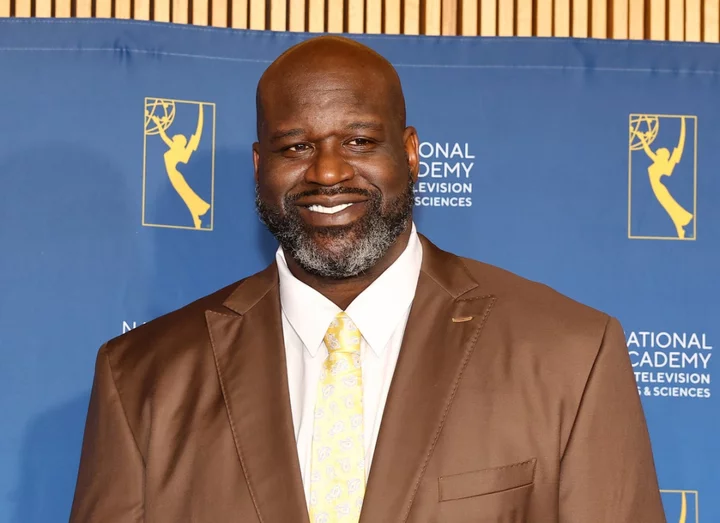
Shaquille O’Neal opens up about his 55-pound weight loss: ‘I couldn’t even walk up the stairs’
Shaquille O’Neal has spoken candidly about his fitness and health goals while opening up about his 55-pound weight loss. The former NBA star, 51, discussed his recent weight loss, and his “crazy goals” for himself, during an interview with Entertainment Tonight, where he revealed that he decided to change his lifestyle after realising he couldn’t “walk up the stairs”. “I was getting chubby and couldn’t even walk up the stairs. I didn’t like the way I looked in the mirror,” he explained. “I was like, ‘I’m gonna lose 20’ and then I was trying to lose 20.” According to O’Neal, who weighed 406 pounds at the start of his journey, he began by exercising, with the Los Angeles Lakers legend then changing his eating habits as well. He told the outlet that his goal is now to be “between 315 and 330 [pounds],” which he said is what he weighed when he helped lead the Miami Heat to their first NBA title in franchise history in 2006. In addition to losing more weight, the basketball star, who is 7ft 1in, also wants to achieve an “eight pack,” although he joked that he’s halfway to his goal. “I’ve got a five-pack now so I’ve got seven more packs to go because I want to take my shirt off on Instagram,” he said. This is not the first time that O’Neal has opened up about his fitness transformation, as he told the outlet in December that he was inspired to get healthy after a friend called him “fat”. “I got a couple people involved - it’s all about eating right. I got some blood work done, a friend of mine called me and said: ‘You’re fat,’ and she gave me this guy’s name, and he did some blood work, and you know, ‘cause I was the athlete - I wasn’t a salad eater. I won’t pay attention to any of that. I don’t care about none of that,” he recalled at the time. According to O’Neal, he also hadn’t known the difference between “a carb and a protein”. “At 50 years old I never knew. So, he was saying you can’t do this, you can’t do that, more vegetables, my iron’s low. And once I just started changing those certain things, it dropped,” he said. Read More Shaquille O’Neal says he follows ‘respectable nepotism’ philosophy when it comes to his children Shaquille O’Neal surprises family by paying for their washer and dryer at Home Depot
2023-09-02 02:49
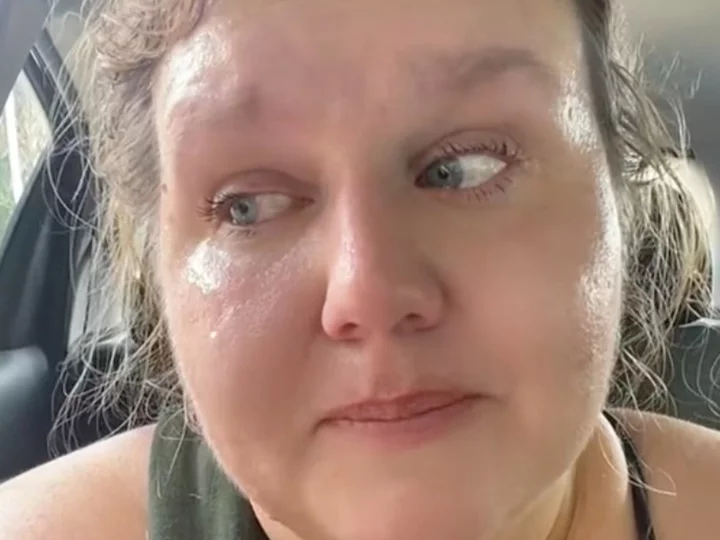
Woman shares heartfelt story of a stranger’s kind words to her at the gym
A woman shared an emotional story about a stranger’s kind words at the gym which brought her to tears. In her viral TikTok video, a gym-goer named Steph (@steph5468) said that after working out for almost “over two years” she has been “struggling” lately with her progress, especially after an incident a few weeks previously in which two men made some cruel remarks about her weight. She told viewers that one of them “coughed into his hand and said ogre,” which she admitted hurt her feelings. Ever since that interaction, Steph has been grappling with “deep-rooted insecurities” about her weight, which has been impacted by ongoing medical issues. To treat her ailments, she explained that she takes “steroids” which have caused “blood clots” among other problems. As she has tried to deal with her medical issues, Steph said that she was, in turn, “neglecting” herself. When a man with “tattoos all over” approached her as she left the gym, she told viewers that she was bracing herself for what she thought was another bully. As a self-proclaimed overthinker, Steph remarked, “There are a lot of thoughts going through your head being a bigger woman in the gym because there’s all sorts of ages there, different body types, like super fit, not fit, and it kind of messes with your head.” What he ended up saying to her was not at all what she expected. She recounted: “He goes, ‘I’ve seen you in here every week, almost every day. I see you in here every week and I’m proud of you.’” His words of encouragement hit Steph hard, motivating her to make a video about the kindness of this stranger. “You have no idea how much people that are going through something appreciate the kindness,” she said through tears. “He didn’t have to say it, he doesn’t even know what I’m going through.” She continued to say that nobody besides the management at the gym knew about her medical condition. “I’m just grateful for people like you guys that encourage us, people like me. Even if you’re not like bigger but you’re still, like, insecure about something.” “I was having a hard day today but you know what?” Steph told viewers. “That made my day.” @steph5468 #gymprogress #workputjourney #keepgoing #healingjourney ♬ original sound - X There was an outpour of support for Steph and the stranger’s act of kindness online, with one fitness coach commenting on the video: “Just having someone say they are proud of you can move mountains for so many of us.” “To be seen as we are is such a human need in each of us,” someone else remarked. Another wrote, “Little happiness snowballs. We all gotta throw them sometime.” Many have taken to writing encouraging comments on Steph’s personal account where she frequently posts about her ongoing fitness journey. Including comedian Paul Kim, who commented on a recent video of Steph’s, saying: “Crush them with your consistency and progress. You got this!!! We believe in you.” The Independent has contacted Steph for comment. Read More Influencer sparks debate after admitting she asks to see man’s bank account info on first date Fitness influencer Larissa Borges dies aged 33 after double cardiac arrest Schoolboy almost dies from swallowing magnets for TikTok challenge Woman shares honest review of New York City apartment TikTok mom slammed after making 5-year-old son run in 104 degree heat
2023-09-02 02:15
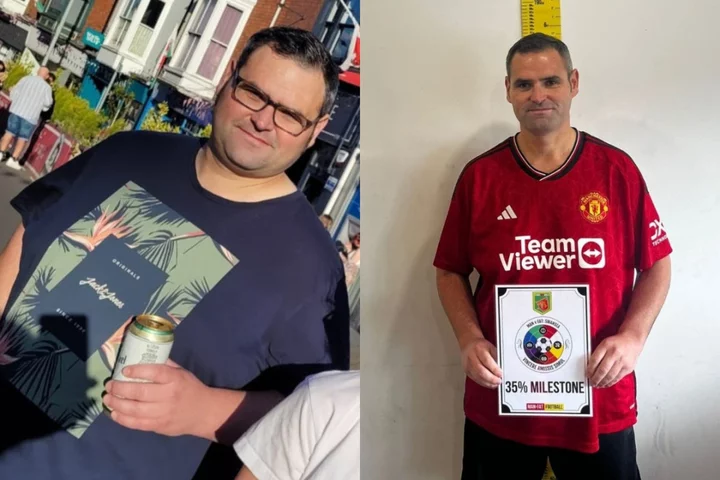
How did a man who dodged theme parks due to his weight lose nearly 60kg in under a year?
A man who “had anxiety all the time” because of his weight has lost more than 58.5kg after rediscovering his love of football and playing a weekly game of seven-a-side, and has now “gained a lot more confidence” and says his anxiety is “more controllable”. Kyle Bamford, 40, a scrap operative, who lives in Swansea, South Wales, with his wife Deborah, 41, and their three children, Caitlin, 18, Masie, 14, and Lola, 11, reached his heaviest weight in 2022, weighing around 161.5kg. At the time, he “suffered quite badly with depression”, “drank a lot”, comfort ate and even avoided socialising because he thought “people were judging (him)”. After coming across a friend’s social media post about Man V Fat, a weight loss programme that encourages overweight men to play football once a week, he had a “wake-up call” and decided to sign up. Since joining the club, in October 2022, Kyle has gone from a size XXXXXL to XL, lost 10 inches on his waist, and has lost 58.5kg – although, he still has to remind himself “that this is a big achievement”. Kyle admits that he still has “anxiety and nerves” but thinks it has got “a lot better” since losing weight. He has also noticed that the pain he was feeling “vanished overnight” and he can now do more things with his children – before, he was “too anxious” to go to theme parks with them as he was scared he could not fit on the rides. Kyle’s next goal is to get down to 99.9kg and he is considering playing football “competitively” once a week, as well as the weekly Man V Fat sessions. He told PA Real Life: “Before I lost weight, my wife said to me that when our kids grow up, I might not be able to do anything with them without getting out of breath. “I’d never go to theme parks, and I’d think of excuses because I was anxious of not fitting on the rides. “And now, I’ve got no problem with that. “My wife has also said that I’m more confident and she can notice that I’m happier too.” In early 2022, Kyle reached the heaviest weight he has ever been, weighing 161.5kg, with a BMI of 50.9 making him obese, and it began to take a toll on his mental health. He said: “I was just depressed and just had anxiety all the time. “I suffered quite badly with depression and I just drank a lot – eating was comforting more than anything. “I was quite anxious buying clothes and socialising, and I didn’t like seeing anyone from my past because I was smaller then. “I hated going to parties and things like that because I thought people were judging me.” In October 2022, one of his friends posted on Facebook about a weight loss programme called Man V Fat which involves overweight men playing football once a week. Kyle said: “I always enjoyed football and sports, and when I put the weight on, I fell out of love with it and lost interest in it. “When I saw my friend’s progress on Facebook, I couldn’t believe how much he had lost. “I signed up to Man V Fat when I was drunk and completely forgot about it. “When I got the call from them, I had a bit of anxiety and it was a bit of a shock but once I considered it, it felt like a wake-up call that I had to do something about my weight.” The following week, Kyle went to his first football session. He explained how the programme works: “At the start of the season, you register your weight and then you get weighed every week from then on. “You’re on a football team, and that gives you an incentive to lose weight because you play a 28-minute game of football, and if you have not lost weight, the other team gets points. “If you have lost weight, your team gets penalties.” After attending a few sessions, Kyle began to notice a difference in his weight and made small changes in his diet. He said: “My wife and I are very fussy, we like all the bad stuff really, to be honest. “But one thing I did do is cut out takeaways and pop, and I did see a big difference with just those two changes. “My guilty pleasure was on a weekend, after heavy drinking, I would order a takeaway, but I stopped doing that.” Kyle also started to track his calories on the MyFitnessPal app, and the more he lost, the more motivated he felt. He explained: “I stuck to MyFitnessPal religiously, and I think within the first month of joining Man V Fat, I was looking for excuses to quit. “I had all the negative thoughts go through my head, but I did stick at it. “I stepped on the scales a couple of weeks at a time, and I noticed my weight was dropping. “Something clicked in my head and I wanted to see how far I could go.” After 10 months of weekly football sessions and sticking to a calorie deficit, and now starting to go to the gym six times a week, Kyle has lost 58.5kg and is now 103.5kg. He said: “I always put myself down, and I have to remind myself that this is a big achievement. “I feel like I’ve gained a lot more confidence, but I still suffer with anxiety and nerves, but it’s a lot better and it’s a lot more controllable now. “I did suffer a lot of pain before I lost weight and it vanished overnight. “Now I go to parties and I definitely come out of my shell more easily.” Looking to the future, Kyle’s next goal is to get his weight down to double figures. He said: “I think 99.9kg is my goal – it will be hard but I think I can do it. “Now I’m back playing football I’m actually enjoying it again, and I’m looking to start playing competitively on a Saturday. “So at the age of 40, I think that is an achievement in itself because I feel like I can do it again.” Read More ‘I felt like a freak’: Woman’s bullying over skin blistering disorder Daniel Radcliffe credits his parents for helping him stay in shape What are the symptoms of prostate cancer and how common is it? ‘I felt like a freak’: Woman’s bullying over skin blistering disorder Daniel Radcliffe credits his parents for helping him stay in shape What are the symptoms of prostate cancer and how common is it?
2023-09-01 22:49
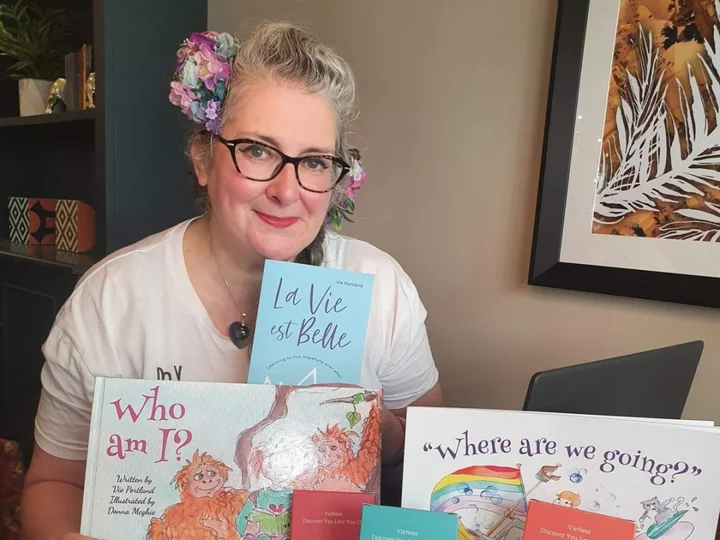
Woman bullied over skin blistering disorder writing books to stop other children ‘feeling like freaks’
A woman who was born with a rare inherited skin blistering disorder which caused her to get “bullied” and feel “like a freak” throughout her childhood and teenage years, as well as forcing her onto a soft food diet of “bananas and custard” for weeks at a time, now writes inclusive children’s books with a focus on disability to encourage “other children to grow up with confidence”. Vie Portland, a 52-year-old confidence coach, author and speaker from Winchester, was born with epidermolysis bullosa simplex generalised intermediate but was not formally diagnosed with the skin condition until she was 28. According to the NHS, epidermolysis bullosa (EB) is a rare inherited skin disorder that causes the skin to become very fragile, and any trauma or friction to the skin can cause painful blisters. Vie is yet to find a treatment that helps her condition, and her feet are regularly covered with huge internal blisters which feel like she has “stones under (her) skin.” Her condition even means that she cannot eat “anything acidic or too peppery” and often spends weeks eating “just bananas and custard”. She has also developed thoracic outlet syndrome, chronic bursitis, and often has spasms, because of walking with a limp to try to ease the pain. Now, Vie writes inclusive children’s books to raise awareness about living with a disability, because she grew up “afraid that there was no one else like (her)”, and hopes to write a book about someone with her condition next. Vie told PA Real Life: “So it feels like I’ve got stones under my skin all the time on my feet and it doesn’t matter how much you try to explain that to someone people just don’t get it. “Even things like if I meet friends for a drink in a lovely pub garden – I’ll be in agony because of walking on gravel and it takes so much energy out of me. “I can’t eat anything acidic or too peppery – sometimes I have to eat just bananas and custard for weeks.” Vie was born with the skin condition, saying: “I was born with no skin on my bottom and had some skin missing on my left foot. “The charity that works with people that have EB wasn’t around then – I spoke to someone recently from Debra, the charity, and they said if you looked at all the people on a double-decker bus, you’d expect to find at least one person with psoriasis. “But, you’d have to wait for over 700 buses before you met someone with EB.” As a child, Vie regularly had huge blisters all over her feet and the back of her heels. She explained: “I remember wearing jelly shoes one summer, and heat and friction are two of my triggers. “Throughout the day, blisters grew around the rubber shoes and I had to have the pair of shoes cut off my feet – it was excruciating.” When Vie was a teenager, she was very self-conscious of her condition, she explained: “I was in constant pain, and I struggled with all shoes and walking anywhere. “We’re always told not to pop blisters, but when you have EB they tell you to pop them because they get so big. “I didn’t know that at the time and it was just so painful. “People were noticing how I walk and I was embarrassed to show my feet – I didn’t have a normal childhood because of this. “Even something as simple as opening a bottle makes several layers of skin come off and cause me to have raw skin all over my hands, I was told this was weird by other people.” Doctors were baffled by Vie’s condition, over the years, she was told she had different types of eczema and even that she was allergic to her own sweat. But, at age 28, she was diagnosed with EB by a dermatologist in London. She said: “I just grew up believing that it was my fault and I was afraid that there was no one else like me.” “It all just made sense. “They even took pictures of my feet for a medical journal because it was so rare.” After getting her diagnosis, Vie began researching the charity DEBRA, which specialises in EB. She said: “I started finding out that there were people like me – it was amazing, growing up, I was bullied and felt like a freak.” Since then, Vie has sadly not been able to find a treatment that helps her condition. “There’s no cure for EB but things have moved on a lot over the past 20 years,” she said. “We have special types of dressings and creams which can help alleviate the pain.” On top of this, because Vie has been walking “unusually” for most of her life, she has developed thoracic outlet syndrome, chronic bursitis, and often has spasms. Vie said: “It can be frustrating at times because it just feels like no one will ever understand what it is like. “For most people, blisters are a bit painful, but it’s all right, but for me, it’s one of the worst pains in the world.” Now, Vie is focussing on raising awareness about living with a disability, and has recently written two inclusive children’s books called ‘Where Are We Going?’ and ‘Who Am I?’. She said: “I want other children to grow up with confidence and not to feel like a freak like me. “Children aren’t born with prejudice and I think it’s really important to teach them about all of our amazing cultures and worlds. “In my books, I don’t explicitly say the character is disabled until the discussion questions at the end – I want the character to be accepted and not defined by their disability. “I think people have more in common with each other than things that are different, and that’s a beautiful thing. “I’m hoping to write a book about someone with my condition – that’s my next plan.” Read More Charity boss speaks out over ‘traumatic’ encounter with royal aide Ukraine war’s heaviest fight rages in east - follow live Fraser Franks undergoing heart surgery – four years after ‘hidden’ condition cut short football career 4 viral TikTok make-up trends you’ll actually want to try Childhood Cancer Awareness Month: What are the warning signs that your child might have cancer?
2023-09-01 21:23
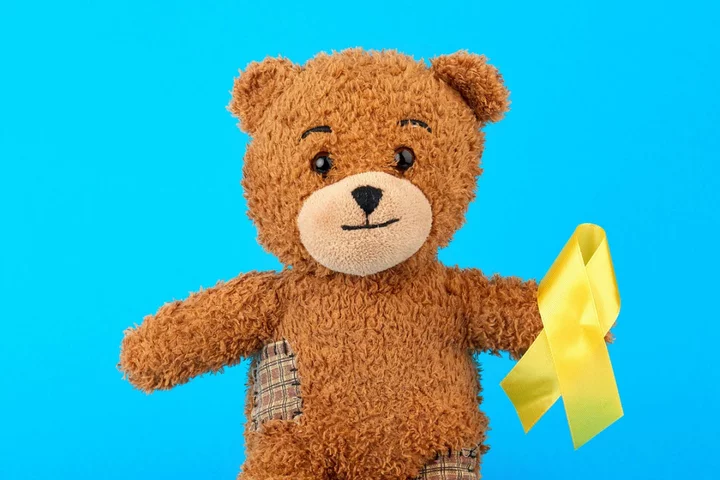
Childhood Cancer Awareness Month: What are the warning signs that your child might have cancer?
It’s heart-breaking to see a child that’s seriously ill, particularly when they’ve got cancer and might not survive. But children do get the disease – and it’s being highlighted during September’s Childhood Cancer Awareness Month. Fortunately, it’s not common. But every day in the UK, 10 families receive a cancer diagnosis for their child, teenager or young adult, and it’s the leading cause of death in children under 14, according to the charity Children With Cancer UK (CWCUK). However, Jeanette Hawkins, chief nurse at the Children’s Cancer and Leukaemia Group (funded by Young Lives vs Cancer), stresses that childhood cancer isn’t as rare as people might think, with a similar risk as diabetes, epilepsy and bacterial meningitis. “Use of the word rare for childhood cancer is a barrier to diagnosis as both GPs and parents therefore don’t consider it’s possible,” she explains. “Families, on average, have three to five GP visits before cancer is suspected. We need to reduce that by increasing awareness. Remember that childhood cancer is often a constellation of non-specific persistent symptoms, rather than a single ‘red flag’ that would alert a GP. “If you’re worried about your child keep going back.” Christiana Ogunbote, head of research at CWCUK, says childhood cancer accounts for less than 1% of all cancers in the UK, and explains there are 12 main categories of cancers affecting children, with the most common being leukaemia (30%), brain, central nervous system (CNS), intracranial tumours (26%) and lymphomas (11%). Ogunbote says cancer symptoms in children can vary widely depending on the cancer type and where it is in the body, but points out: “Often the individual symptoms of cancer can be similar to common childhood illnesses, so it can be hard to identify. “If a symptom progresses or doesn’t get better as quickly as expected, we would suggest getting it checked out by a medical professional. It’s useful for parents who know what’s ‘normal’ for their child to be aware of the signs and symptoms of cancer, as earlier diagnosis will support better outcomes for children and young people.” Here, Ogunbote outlines the symptoms of the three most common childhood cancers… 1. Leukaemia Symptoms of leukaemia in children and babies, which may be acute myeloid or acute lymphoblastic leukaemia (ALL), can include frequent and persistent infections, unusual bleeding and/or bruising, tiredness, paleness, breathlessness and, with ALL, coughing and anaemia. “Childhood leukaemia develops quickly,” says Ogunbote. “but it’s possible for some or all of these symptoms to be apparent.” She says a leukaemia diagnosis can be made from a blood test, which may reveal low numbers of normal white blood cells and large numbers of abnormal white blood cells. Further tests will then be done on a sample of bone marrow to confirm the diagnosis. 2. Brain and spinal tumours The symptoms of brain and spinal tumours (central nervous system tumours) vary between age groups, says Ogunbote, but symptoms in babies may include persistent/recurrent vomiting, balance/co-ordination/walking problems, abnormal eye movements or suspected loss of vision, behaviour change (particularly lethargy), fits or seizures (not with a fever), abnormal head position such as head tilt or stiff neck, and increasing head circumference. Children’s brain tumour symptoms are similar to symptoms in babies, but may also include a persistent/recurrent headache, blurred or double vision, fits or seizures, reduced consciousness and abnormal growth. Ogunbote says symptoms vary depending on the type and site of the tumour, and develop much more slowly with low grade tumours. But she stresses: “It’s important to remember that many of these symptoms are extremely common, and experiencing one by itself is rarely a sign of a brain tumour.” A CT or MRI scan will be done if a brain tumour is suspected, and if the scan confirms the diagnosis, further investigations will determine the type of tumour and best treatment. 3. Lymphoma Children may get a cancer of the lymphatic system known as either Hodgkin or non-Hodgkin lymphoma, and Ogunbote says symptoms of both include a persistent (lasting a few weeks) painless swelling of a single lymph gland, usually in the neck, or possibly in the armpit or groin with non-Hodgkin, a cough or breathlessness (if glands in the chest are affected), fevers, sweats, and weight loss. There may be itching with Hodgkin lymphoma, and with non-Hodgkin there may be tiredness, feeling full after a small meal, stomach pains (if abdominal lymph glands are affected), and sleep sweats. Diagnosis is confirmed by removing part or all of an affected lymph gland, usually under general anaesthetic, and doing a biopsy on it so the cells can be examined in a laboratory. Further tests, like x-rays, CT and MRI scans and blood tests, will also be carried out to determine the size and position of the lymphoma and whether it has spread. This is known as staging. “Many of the symptoms of lymphoma can also be symptoms of other illnesses, so this can make it difficult to diagnose,” explains Ogunbote. “Symptoms your child might experience depend on where the lymphoma is in their body, and symptoms vary from child to child, even if they have the same type of lymphoma.” Read More Charity boss speaks out over ‘traumatic’ encounter with royal aide Ukraine war’s heaviest fight rages in east - follow live 4 viral TikTok make-up trends you’ll actually want to try Daily aspirin dose could help prevent diabetes in older people – researchers Secondhand September: The best places to buy pre-loved fashion online
2023-09-01 16:25
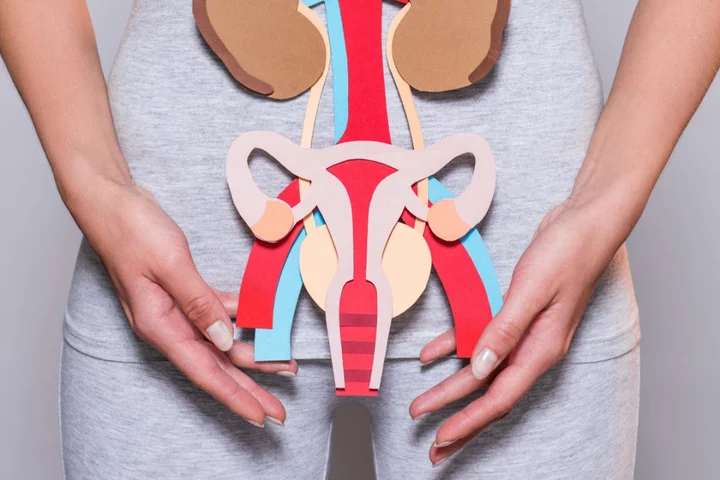
What are gynaecological cancers and how can you prevent them?
September is Gynaecological Cancer Awareness Month, which sees charities joining together to put the spotlight on the range of cancers that start in the female reproductive system. There are five main types of gynaecological cancer – cervical, ovarian, vaginal, vulvar and uterine (or womb) – plus fallopian tube cancer, although this is very rare. Around 22,000 women are diagnosed with a gynaecological cancer each year in the UK, of which 21 die every day, according to charity The Eve Appeal. However, some of these cases are preventable, and with the right treatment, many gynaecological cancers have high survival rates. Here, experts answer some key questions about the prevention and treatment of gynaecological cancers. What are the symptoms of gynaecological cancers? “The symptoms of gynaecological cancers can vary,” says gynaecologist Oudai Ali from New Victoria Hospital. “But some common signs to watch out for include abnormal vaginal bleeding, pelvic pain or discomfort, unusual vaginal discharge, new vulval lump or ulcer and changes in urinary or bowel habits.” If you’ve noticed any of these signs, follow the ‘if in doubt, check it out’ rule, Ali says: “It’s crucial for patients to consult their GP if they experience any of these symptoms, as early detection can significantly improve treatment outcomes.” Severe ongoing bloating and feeling full very quickly, unintentional weight loss and fatigue are also indications it’s a good idea to get things checked out. Are regular screenings important for gynaecological health? Routine screening programmes are not available for all types of gynaecological cancer. However, where they are available – such as cervical smear tests – attending screenings can be life-saving. “Regular screenings, such as smear tests and HPV (human papillomavirus) tests, are vital for the early detection of cervical cancer and can prevent it at its pre-cancer stage,” says Ali. “Additionally, it’s important for individuals to discuss family history and risk factors with their healthcare provider to determine which screenings are appropriate.” Research shows that cervical cancer risks are higher for people who don’t attend screenings. “Cervical cancer risk is estimated to be 1.7% among women in the UK who don’t attend screenings,” says Mr Andrew Pooley, consultant gynaecologist at New Victoria Hospital. “Other risk factors are related to a higher exposure to HPV, the use of the contraceptive pill for over 10 years, or a weak immune system.” Ali adds: “The age to start screening can vary depending on the type of cancer and a patient’s individual risk factors. Pap smears typically start around age 25.” For cancers where there isn’t a national screening programme, your GP can refer you for blood tests and scans if you are concerned about symptoms. Can gynaecological cancers be prevented? While not all gynaecological cancers can be prevented, there are steps you can take that in some cases may help reduce your risk. “Maintaining a healthy lifestyle, including a balanced diet, regular exercise, and avoiding tobacco, can help,” Ali says. “The HPV vaccine is a powerful tool in preventing certain gynaecological cancers. It protects against several strains of HPV that can lead to cervical, vaginal, and vulvar cancers. It’s recommended for both boys and girls, ideally before they become sexually active, to provide the greatest protection.” Some gynaecological cancers can have a hereditary component, too. “A family history of bowel, breast or ovarian cancer may increase the risk,” Ali explains, which is why it’s important to discuss family medical history at screenings. “They can assess the risk accurately and recommend appropriate screenings or genetic testing if necessary.” This said, anyone can potentially get cancer, so getting any symptoms checked as soon as possible is always key. What are the available treatment options for gynaecological cancers? Treatment options vary depending on the type and stage (from one to four) of cancer. “They may include surgery, chemotherapy, radiation therapy, hormone therapy, targeted therapy, or a combination of these treatments,” says Ali. “The choice of treatment is personalised to each patient’s specific diagnosis and medical history.” Survival rates for the main five gynaecological cancers when diagnosed at stage one range from 75%-95% according to Cancer Research, which further highlights the importance of early detection. New Victoria Hospital has launched its Community Champion Campaign, which will offer free scans and treatment to people across the UK for the sum of £125,000. To apply visit: newvictoria.co.uk/communitychampioninitiative. Read More Charity boss speaks out over ‘traumatic’ encounter with royal aide Ukraine war’s heaviest fight rages in east - follow live Alzheimer’s: How and when to talk to someone about their memory loss As Simon Cowell shares positive therapy experience, how can it help even if you aren’t in crisis? Project launched to bust myth that cancer is a ‘white person’s disease’
2023-09-01 14:22
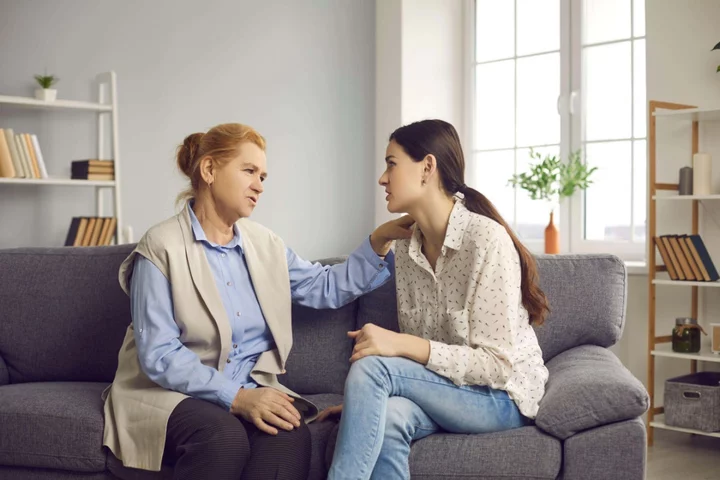
Alzheimer’s: How and when to talk to someone about their memory loss
You may have noticed someone close to you changing – perhaps they are more forgetful, not quite themselves. After a quick search online or a chat with family members or friends, you may be left thinking they’re developing Alzheimer’s. But how do you approach a conversation about dementia when it’s such an emotive topic? “As we get older, we’re all prone to becoming more forgetful, taking longer to remember certain things, getting distracted more easily or struggling to perform several tasks at once,” says head of knowledge at Alzheimer’s Society, Dr Tim Beanland. “These are common signs of getting older, but there is still a very sharp distinction between normal ageing and dementia.” Symptoms that may worry you “Symptoms of dementia gradually get worse over time,” Beanland explains, “and can appear as memory loss, confusion, needing help with everyday tasks, problems with language and understanding, or changes in behaviour. Although symptoms typically occur in people aged 65 and over, they can occasionally appear as early as twenty years sooner.” You may be scared Seeing these types of changes is understandably worrying – it’s a reminder of the age and health of those around us. “Noticing what might be dementia symptoms in a loved one can be distressing and confusing, particularly for people who have never dealt with dementia before,” Beanland says. “Both parties may feel nervous or worried about how to address the topic of potential dementia symptoms, and may not know where to begin.” Be open Beanland suggests asking questions like, ‘How are you feeling lately, physically and emotionally?’ Or ‘Do you have any health worries you’d like to talk about?’ It’s important to remember when approaching someone who may be experiencing dementia symptoms to do so gently, calmly and in a reassuring and supportive manner. “People experiencing dementia symptoms may find it difficult, or take a bit longer, to find the words they wish to say,” notes Beanland. “So, allowing them extra time, or giving them gentle prompts, can help them find the words they’re looking for, without highlighting they’ve forgotten something.” Do your research Dementia or Alzheimer’s may not be the only answer. It’s important to remember there are other conditions which can cause similar symptoms to dementia, such as thyroid problems or urinary tract infections, says Beanland. “Try to focus on helping the person see their GP, to find out what is causing the problems they are having. It’s also important to understand that, whether you are experiencing dementia symptoms personally or you’re a concerned loved one, you do not have to face dementia alone. There is support out there for you. “I’d encourage anyone worried about their own or a loved one’s memory to use Alzheimer’s Society’s symptoms checklist. It will help to unlock the vital care and support you need, and give you the precious time needed with your family to plan for the future.” Read More Charity boss speaks out over ‘traumatic’ encounter with royal aide Ukraine war’s heaviest fight rages in east - follow live As Simon Cowell shares positive therapy experience, how can it help even if you aren’t in crisis? Project launched to bust myth that cancer is a ‘white person’s disease’ 10 slick ways to kit out your student digs
2023-09-01 13:17
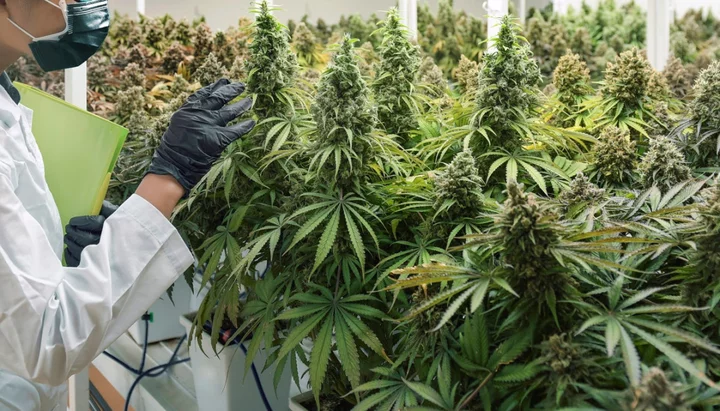
Marijuana users have higher levels of toxic metals in blood and urine, study finds
People who use marijuana were found to have higher levels of lead and cadmium in their blood and urine, in comparison to those who do not use weed, according to a new study. The team of researchers at Columbia University analysed data from blood and urine samples collected between 2005 and 2018 as part of the National Health and Nutrition Examination Survey, a program conducted by the National Center for Health Statistics. They looked at samples of 7,254 people who said they had used marijuana in the last 30 days. Participants were examined for levels of heavy metals and 358 people were found to have 27 per cent higher blood lead levels than those who said they didn’t use either marijuana or tobacco. There were also 22 per cent higher levels of cadmium in those marijuana users according to the research, which was published Wednesday in the journal Environmental Health Perspectives. Researchers also found that the urine samples showed similar results. High levels of cadmium can cause stomach irritation, abdominal cramps, nausea, vomiting and diarrhoea, according to Better Health. Researchers found that although tobacco is the main source of cadmium exposure in the general population, the study showed similar exposure levels among cannabis users. “For both cadmium and lead, these metals are likely to stay in the body for years, long after exposure ends,” Tiffany Sanchez, an author of the study and an assistant professor of environmental health sciences at Columbia’s Mailman School of Public Health said to NBC News. As cannabis plants can absorb heavy metals from soil - the new findings demonstrate that heavy metals in cannabis plants can also wind up in the human body. “Previous studies have measured metals in marijuana plants, products, or marijuana smoke,” study authors have said. Lead exposure can be particularly harmful to children and pregnant women. In adults, chronic exposure to lead increases the risk of high blood pressure, heart problems and kidney damage. “Our study wasn’t able to tease apart whether or not self-reported cannabis users were using medical or recreational cannabis, so we can’t say definitively if medical cannabis users specifically had higher metal levels,” Sanchez said as reported by CNN. “This is something that should be evaluated in future studies.” Heavy metals bind to parts of your cells that prevent your organs from doing their job, according to the Cleveland Clinic and symptoms of heavy metal poisoning can be life-threatening and can cause irreversible damage. “Immunocompromised people, such as those going through chemotherapy, may be at greater risk from metal exposure or from other common cannabis contaminants like molds. However, this is very much an understudied area,” Sanchez added. On Wednesday, the Department of Health and Human Services recommended that the Drug Enforcement Administration ease restrictions on marijuana by moving it from Schedule I drug to Schedule III. HHS Secretary Xavier Becerra said on X, the platform formerly known as Twitter, that the agency has responded to President Joe Biden’s request “to provide a scheduling recommendation for marijuana to the DEA.” “We’ve worked to ensure that a scientific evaluation be completed and shared expeditiously,” he added. Senate Majority Leader Chuck Schumer said in a statement that HHS had recommended that marijuana be moved from a Schedule I to a Schedule III controlled substance. “HHS has done the right thing,” Schumer said. “DEA should now follow through on this important step to greatly reduce the harm caused by draconian marijuana laws.” Rescheduling the drug would reduce or potentially eliminate criminal penalties for possession. Marijuana is currently classified as a Schedule I drug, alongside heroin and LSD. According to the DEA, Schedule I drugs "have no currently accepted medical use in the United States, a lack of accepted safety for use under medical supervision, and a high potential for abuse." Additional reporting from agencies Read More Biden health agency recommends classifying marijuana as lower-risk, opening potential for major policy changes Seth Rogen reveals why he smokes marijuana ‘all day, every single day’ Rugby star Ugo Monye: Boarding school shaped my career and my personality Queen Latifah calls for more ‘inclusive healthcare’ for people with obesity As Simon Cowell shares positive therapy experience, how can it help even if you aren’t in crisis?
2023-09-01 00:46
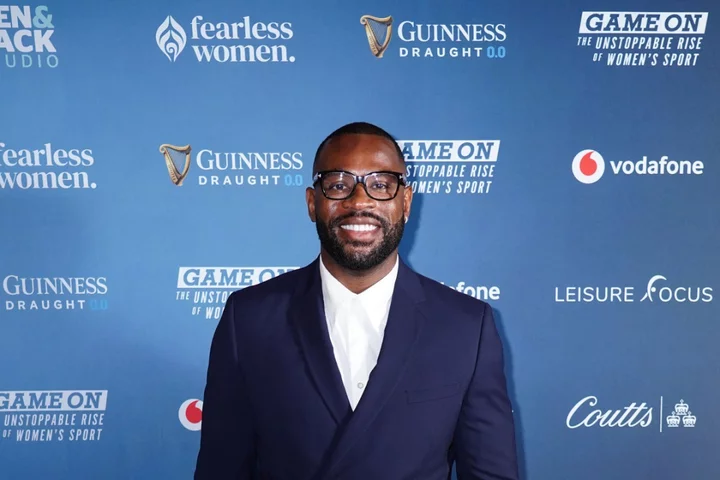
Rugby star Ugo Monye: Boarding school shaped my career and my personality
The Rugby World Cup and new series of Strictly Come Dancing are both set to kick off soon – and one man who knows just how hard both of them are is Ugo Monye. “Strictly is gruelling,” says the former rugby pro-turned-pundit, who played with Harlequins and England before taking part in Strictly in 2021. “At times you’re training for 12 hours a day. So, you could go for a period of three or four days where all you do is wake up, go to the studio, go to sleep, wake up, go to the studio, go to bed.” He recalls recently telling his friend, comedian Eddie Kadi, all about this, the night before he was announced as a contestant for this year’s show. And because of the demanding schedule, taking care of yourself becomes a top priority. “You try and eat right, try and get as much sleep as possible. The biggest initial challenge everyone will find is their feet, because they wouldn’t have been used to dancing for 11 hours a day,” adds Monye, 40, who was partnered with Oti Mabuse on the show. Trading his rugby boots for ballroom shoes came with some challenges, but he still completed five weeks on the show (Monye and Mabuse finished in 11th place that year). “I remember when I did the quickstep, I had my smart watch on, which showed that I danced over 45km in five days,” he recalls. “I remember the first week or two, just the nervousness of rolling out of bed and putting my feet on the carpet because you didn’t know how they would feel.” Having played such a physically demanding sport for 13 years at pro level, Monye was not in bad shape. But Strictly was another “type of pressure”. “When I retired in 2015, I never thought that I’d be dancing, dressed in a low cut, electric pink, short sleeve shirt doing the samba. It’s something I’m actually really proud of,” he adds happily. Like lots of people, Monye, who has two daughters – Phoenix Lilly, six, and Ruby, three, with his ex-wife Lucy – recalls how his approach to self-care has evolved over the years. “Going back to the early 2000s, I was living the dream, right? I was 18 and I got a professional contract playing for my boyhood club, and within a year I travelled the world playing for England,” he says. “I was all, what mental health? I’m flying, right?” Things shifted with time, however, and he began to see the importance of having a proactive approach to maintaining his mental wellbeing. “I remember speaking to a friend, who is really interested in mental health, [about how] people often seek [mental health support] after something bad or traumatic has happened to a point where they actually need it. But it’s more like how you have to go and get an MOT on your car and service it,” he explains. “I think towards the end of my career, I became more aware of it. I have now definitely paid more attention to it and I absolutely love psychology, so I love understanding how the mind works.” Since his retirement, Monye – who has teamed up with Samsung ahead of the World Cup, which starts on September 8 – he has been busy being a dad, alongside jumping into a vibrant broadcast career. Having daughters made him reflect on his own upbringing too – going from being raised by a single mother on a London council estate, to a rural boarding school in Hampshire where he had his education funded (Monye secured a sports scholarship when he was 13). He attributes a lot of his success to his schooling. “I think the person I am now was born at age 13. Everything I was surrounded by was slightly different in that world. It was where I first was introduced to rugby, which then has quite clearly gone on to shape my career, the pathway that I have now, but also my personality. “I think I rely upon myself, I back myself. I had to depend on myself and try and get things done,” he reflects. “I think my personality traits, good and bad, were all developed at boarding school.” Having spent large chunks of his childhood away from family, how does he manage his own work-life balance as a parent now? “How do you manage your work-life balance? Well, you stand in the middle of the park taking a phone call,” he jokes (Monye is in the playground with his girls while we talk). “The time I have with them is absolute quality. For the World Cup, I’m going out for like three or four stints. I’d love them to be able to come out, but with school, it is a bit more difficult. “But I have said to Phoenix already that next year is the Olympics, and she loves gymnastics, so she’s going to be getting on the Eurostar with me. She is watching a lot of clips of Simone Biles at the moment on YouTube and she’s obsessed.” He wants to see his daughters inspired by brilliant women. “I love to watch sports with my daughters,” says Monye. “And we loved watching the Women’s World Cup. I had to get them to come and watch incredible women just do it.” Ugo Monye has teamed up with Samsung to help the nation see the new laws clearly and watch the match in supersize, thanks to the Samsung 98” Q80C TV (samsung.com/uk/big-screen-tv). Read More Charity boss speaks out over ‘traumatic’ encounter with royal aide Ukraine war’s heaviest fight rages in east - follow live As Simon Cowell shares positive therapy experience, how can it help even if you aren’t in crisis? Project launched to bust myth that cancer is a ‘white person’s disease’ 10 slick ways to kit out your student digs
2023-08-31 23:25

Queen Latifah calls for more ‘inclusive healthcare’ for people with obesity
Queen Latifah is calling for more inclusive medical care for people with obesity. In a new interview as part of her work with It’s Bigger Than Me, a US-based campaign by healthcare company Novo Nordisk, the actor and rapper recounted how many people with obesity experience weight discrimination from medical staff. Sharing her personal connection to the issue, the Girls Trip star – whose real name Dana Owens – toldPeople: “I saw my cousin have to deal with this issue – she was morbidly obese and she went in and out of the hospital. “There were so many things she had to face. And for a doctor to just say, ‘Oh, you need to lose some weight.’ Well, it’s not that easy. Everyone’s bodies are not the same. We all deserve specific individual care.” Latifah, 53, backed the campaign’s call for “inclusive obesity care” ensuring everyone can feel “welcome and respected” when they visit the doctors. “Imagine how good it must feel when a patient walks through that door and sees the appropriate chairs or office set-up, that someone has considered them, has taken the time to think about what their needs are,” the Hairspray star said. “There’s a sense of, ‘I’m respected here. I’m welcome here’... If you’re discouraged to get into your doctor’s office, then that’s not a good thing.” When a person is defined as obese, this means that they are overweight “with a lot of body fat”, the NHS says. The World Health Organisation (WHO) explains that the terms “overweight” and “obesity” are used to refer to “abnormal or excessive fat accumulation that presents a risk to health”. It is estimated 64 per cent of adults in the UK are obese or overweight. Last summer, a British study found that obese patients were being “weight-shamed by doctors and nurses”, with weight stigmatisation pushing patients to skip appointments. The stigmatisation leads to patients avoiding appointments, feeling depressed or anxious and being more likely to put on weight, scientists said. The British researchers said there needed to be better education for medics over “weight stigma” to avoid this spilling into healthcare. The scientists looked at more than 3,000 research articles on the topic to identify strategies to tackle negative biases towards overweight and obese patients. In doing so, this could help to tackle the UK’s obesity crisis, as negative biases over weight limit access to healthcare services and treatment. Read More Joe Wicks defends decision to pull five-year-old daughter out of school Woman adopts husband’s ex-wife’s son after growing up in foster care herself Man who went to Turkey to make himself taller says pain was ‘worth it’ As Simon Cowell shares positive therapy experience, how can it help even if you aren’t in crisis? Man who went to Turkey to make himself taller says pain was ‘worth it’ Terminally ill mum prepares for worst after numb hand turns out to be deadly disease
2023-08-31 22:17
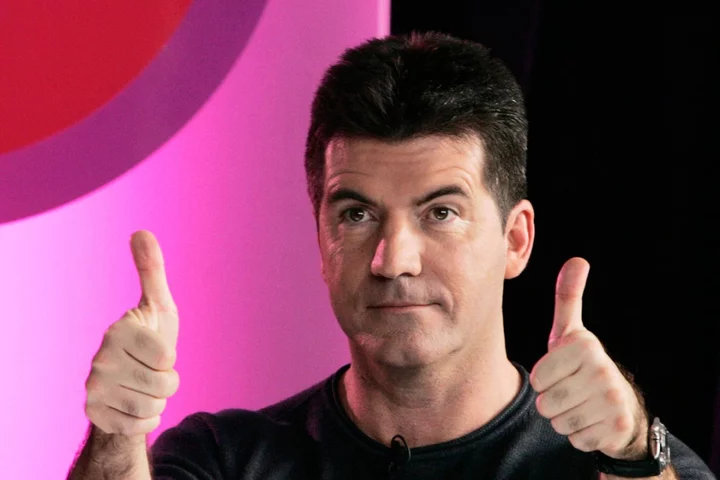
As Simon Cowell shares positive therapy experience, how can it help even if you aren’t in crisis?
X Factor boss Simon Cowell, 63, has shared that having discovered therapy in the past year, he feels as though “a weight has lifted off my shoulders”. The music mogul, who is behind The X Factor and Britain’s Got Talent, said he wished he had seen a therapist “10 or 20 years ago” in a recent interview with the Daily Mirror. He also shared that the deaths of his parents and the coronavirus pandemic had affected his mental health. Seeking therapy has been transformative for Cowell and it could do the same for you, whether you are in crisis, or just want to learn more about yourself. Cowell has said engaging in therapy had a “super positive effect” on his life and encouraged others to do the same, so here’s what you should know. There are different types of therapy Contrary to what many people may believe, counselling, where you sit and talk through events and reflect, is not the only form of therapy. “There are a whole host of different types of therapies available, from counselling, cognitive behavioural therapy, mindfulness-based cognitive therapy, acceptance and commitment therapy, interpersonal therapy, psychodynamic psychotherapy to eye movement desensitization and reprocessing,” explains psychologist and author of The Self-Care Revolution, Suzy Reading.Each one can have a different role in helping you get to know yourself better, handling trauma, feeling more grounded and coping more day-to-day. Therapy isn’t just for rock bottom Therapy doesn’t have to be a last resort. “When it comes to therapy, there are no hard and fast rules,” says Liz Ritchie, a St Andrew’s Healthcare psychotherapist. “Many people associate seeking help with crisis, but there is no reason why you cannot maintain regular sessions with your therapist. There is now a wealth of evidence that supports that therapy can also be a preventative form of mental healthcare, a little bit like going to a dentist or a doctor. “Life is busy and stressful, which means we don’t often have time to process cross words with a loved one, work altercations or issues with friends and family members.” You’ll understand yourself better You may think you understand yourself totally, but there are always new parts of ourselves to get to know. “Therapy helps us better understand ourselves, our relationships and the world, connecting us with how we feel, and why we might feel as we do. It is a journey of self-discovery, helping us appreciate our strengths and identify our values,” says Reading. It could give you an emotional toolkitIt can be helpful to have “an impartial sounding board to speak openly and honestly and the opportunity to be heard, validated and understood”, says Reading. “Therapy helps us challenge unhelpful thoughts, dispute self-limiting beliefs and can help us create new habits. Therapy is also about developing healthy ways to move through our emotions, creating a fresh toolkit of coping strategies and can be very practical in nature by helping us address specific challenges or goals.” But… it isn’t easy Unfortunately getting therapy is not always easy. If you do not have the financial freedom to be able to pay for a private therapist, you may be faced with long waiting lists and restrictive services. However, NHS therapy is an option and can be really helpful, so be sure to look into the options you can afford near you. Reading recommends checking out BPS and HCPC to find a qualified therapist. NHS resources can be accessed here. If you are seriously struggling with your mental health, and are at risk, please call 999 or the Samaritans on 116 123.
2023-08-31 20:54
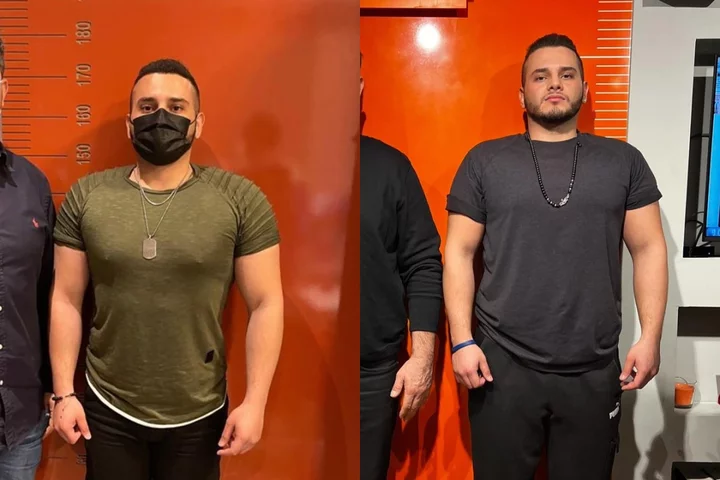
Man who lengthened his limbs by three inches feels ‘so much happier’
A Canadian man has had limb-lengthening surgery, costing £25,000, to increase his height from 5ft 7in to 5ft 10in as he was so insecure about his height it caused him to have “suicidal thoughts”, and claims he is now “so much happier” and “confident”. Daniel Farbod, 27, a civil engineer, from Toronto, Canada, has been self-conscious of his height “all (his) life” – when he stopped growing, at age 14, he said it felt “tragic” and like his “first stab to the heart.” Daniel always defined “being masculine” as being tall, and was “ashamed” of himself as he “didn’t feel like a man.” Over time, being taller was all Daniel could dream about, and claimed his height “impacted his mental health so badly” that he was having “suicidal thoughts”. After coming across the unique surgery online, he realised he was “willing to sacrifice time and money to get (his) life back.” So, in May 2021, he had his first procedure in a specialist clinic in Turkey, which involved breaking his femurs, hollowing out the bone, and putting a rod inside the bone with external fixators, pieces of steel on the outside of his legs. Daniel had to turn the fixators with an Allen key every day for over four months, and eventually had his second surgery to remove the fixators after his bones had successfully fused together. When Daniel recovered, he could not “put into words how happy (he) was” and “felt so much more confident”, now, he is sharing his journey on social media to inspire others who are insecure about their height. Daniel told PA Real Life: “I’m really proud of myself for having the surgery. “I was insecure all my life about my height, it impacted my mental health so badly. “I was suicidal, and after admitting that I wanted to take the steps to feel better, and have the surgery, I feel so much better. “I think for other people, it is important to know how tough the surgery and recovery is – it was the hardest thing I’ve ever done, but for me, it changed my life and made me grow not only literally but also metaphorically as a person.” Daniel, who has always been self-conscious about his height, stopped growing at age 14, and became obsessed with finding ways to become taller. He said: “I researched everything from socks and supplements that claimed to increase your height. “I was always insecure and worried about it – I used to go to orthopaedic doctors because I was so scared of not growing. “But when I got to age 14, I stopped and it was so depressing.” When it became clear to Daniel that he was unlikely to grow any more, it took a toll on his mental health and confidence. He explained: “It was so tragic for me, it was like my first stab to the heart. “All my dreams would be about being taller and I had to somehow accept that my height had peaked. “I tried to keep myself busy to manage my thoughts but in 2020 I just couldn’t handle it – I had all of these negative thoughts and suicidal thoughts because I think being masculine, and being a man, means to be tall. “I didn’t feel like a man, I was so ashamed.” Daniel felt as though having limb-lengthening surgery was the only way he was going to feel better, but his parents, who are both “on the shorter side”, did not approve of his decision to have cosmetic surgery. He said: “Everyone was really against the idea because they thought it was not natural and it was changing the way your body is meant to be. “I knew the surgery was going to be tough, but I thought even that pain would be better than having suicidal thoughts. “I was willing to sacrifice time and money to get my life back.” In May 2021, Daniel had his first surgery in a specialist clinic, Live Life Taller, in Turkey, which involved breaking both of his femurs, hollowing out the bone, and putting a rod inside the bone with external fixators – pieces of steel on the outside of his legs. He explained: “I was really scared when I got to the clinic, and the breaking of the bones was the part I was most nervous about in the whole process. “It was crazy to wake up after the surgery – the reality just hit me all at once and I was so happy.” His recovery involved being in a wheelchair and using an Allen key to turn a bolt on the fixators four times a day at 90 degrees to separate the bone segments a little at a time. Daniel continued to do this every day for four and a half months, saying of his painful recovery: “My skin was stretching, my muscles were growing, it was madness. “It took me even longer to recover, they usually say it will take three months, but, my I had nerve issues with my right leg and had to have it broken again. “It was a very tough time.” In September 2021, the external fixators were removed, he explained: “I used a walker and really really slowly I worked up to using crutches. “I couldn’t really tell how tall I was at that point. “It took me at least another three months to be able to stand up.” Mr Farbod went from 5 ft 7 to 5ft 10 and thinks his mental health has dramatically improved as a result. He said: “I couldn’t believe it. I had been dreaming of being a tall man since I was 10 years old, it’s all I’ve ever wanted. “I went through all these sleepless nights, trauma and upset, and I finally achieved my goal. “I can’t even put into words how happy I was, and still am – I felt so much more confident.” When Mr Farbod arrived home, his family were also very happy for him. He said: “They looked after me so much – I could barely get out of bed or bend down for a long time. “They could tell I was so much happier when I recovered.” Now, Daniel shares his journey on Instagram and YouTube to inspire others who are insecure about their height. He said: “I want to show people the reality of the surgery – it’s tough but I want to raise awareness and get men talking about their insecurities.” For support, contact the Samaritans on 116 123, email them at jo@samaritans.org, or visit samaritans.org to find your nearest branch. Read More Charity boss speaks out over ‘traumatic’ encounter with royal aide Ukraine war’s heaviest fight rages in east - follow live 10 slick ways to kit out your student digs 4 essential officecore trends to update your work wardrobe Sickle Cell Awareness Month: What is sickle cell disease and how do you know if you have it?
2023-08-31 16:52
